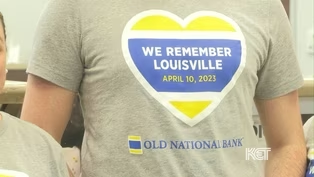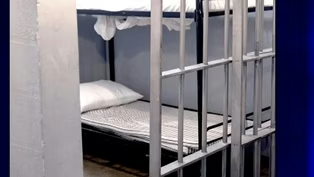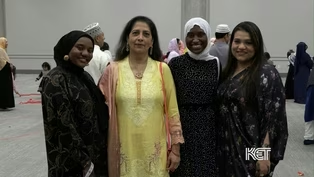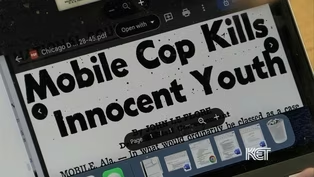
Ryland Barton (4/10/2024)
Clip: Season 2 Episode 225 | 6m 40sVideo has Closed Captions
Mid-Week Political Check-In (4/10/24).
Mid-Week Political Check-In (4/10/24).
Problems playing video? | Closed Captioning Feedback
Problems playing video? | Closed Captioning Feedback
Kentucky Edition is a local public television program presented by KET

Ryland Barton (4/10/2024)
Clip: Season 2 Episode 225 | 6m 40sVideo has Closed Captions
Mid-Week Political Check-In (4/10/24).
Problems playing video? | Closed Captioning Feedback
How to Watch Kentucky Edition
Kentucky Edition is available to stream on pbs.org and the free PBS App, available on iPhone, Apple TV, Android TV, Android smartphones, Amazon Fire TV, Amazon Fire Tablet, Roku, Samsung Smart TV, and Vizio.
Providing Support for PBS.org
Learn Moreabout PBS online sponsorshipI'm Laura Rogers with NPR's Ryland Barton.
And, of course, busy time right now for Governor Andy Beshear, as he has a lot of bills coming across his desk so that he is taking a look whether to sign, whether to veto.
Let's talk Ryland about the Safer Kentucky Act.
Governor Beshear has opted to veto that one.
And supporters, GOP lawmakers that were behind this legislation say it would address public safety across Kentucky.
It would modernize criminal statutes.
What has given the governor pause on this bill?
So it gave the governor pause on this bill is just how sweeping it is.
There's so many things in this bill, and he said that he supports elements of it.
So, for example, there's a policy in here that would require the destruction of weapons that were used during a murder.
So that's something that's kind of sparked a lot of debate over the last year.
And it's been kind of a small element of some sort of gun safety reform that the Republican leaders of the legislature are in favor of.
So he says he supports something like that.
But then there's other huge elements that he doesn't support.
Somethi an element that that essentially criminalizes homeless and it creates a criminal penalties for street camping in Kentucky.
This is something that's there's there's a movement across the country to pass bills like this.
He says that there hasn't been enough to really that one this isn't a good policy on its face but also that there's not enough to show how much this is going to cost.
And along with a lot of the other elements in this bill, which increase criminal penalties, there hasn't been a fiscal analysis.
So how much is this bill going to cost the state?
There have been estimates done.
The liberal leaning Kentucky Center for Economic Policy estimated that would cost the state about $1,000,000,000.
But again, there's no official analysis of the analysis that the LRC did, which is something that normally happens that's supposed to happen with bills like this.
So the states just kind of blindly would be blindly going into passing a bill like this without knowing how much it's going to cost.
So that's one of the bills these vetoed.
Granted, the legislature can come back in and override that veto very easily if they want to.
But again, there's just so many different elements in that bill.
It also includes the street, the three strikes law.
So folks are committed with three separate violent offenses, would then serve life in prison.
So there's just the range of this bill is pretty spectacular.
Stricter penalties for several crimes like that one and others.
All right.
The autonomous vehicles, Bill, this would have allowed driverless cars and trucks on Kentucky roads.
The governor has vetoed that legislation as well, with a lot of support from the Teamsters labor union.
Let's talk about this legislation and why you think the governor was not in support of it.
Yeah, this is a very interesting bill politically.
It's something that actually took a lot to pass out of the legislature.
Republicans weren't totally united on this.
The reason the governor vetoed this, a big reason was because of, you know, union pressure that unions were not in favor of this bill.
They're worried about how this would upend the automotive industry and you that this kind of paves the way towards allowing a driverless vehicles.
So last year, a bill very similar to this passed out of the legislature, but it passed during one of those last days of the legislative session.
So so Governor Christie was able to veto it, but lawmakers weren't able to come back in and override his veto.
So they passed it ahead of the veto period.
This time, Governor Christie business vetoed it.
Now they have the chance to override that veto once again.
But again, there's some this isn't really a slam dunk.
There's some dissension among among Republicans here as to whether or not to pass this.
Granted, there are so many Republicans in the legislature that there might be able to cobble together enough votes to override that veto.
It only takes a simple majority in Kentucky for a bill like this.
So we'll see what happens.
When you say driverless car or a self-driving car, people do get concerned, of course, about safety issues.
But those that have been in support of it say it would address the commercial truck driver shortage and would help Kentucky's growing economy.
Right.
It does seem like there will be an element of this at some point in the future.
But legislatures and the federal government have just started to kind of dip their toes into this.
So bills like this and really this bill also would, you know, try to ease the state into this would require a driver to at least be present for the first few years of this.
But nonetheless, folks are concerned.
And I think we're still kind of seeing how policies like this evolve across the country.
And then quickly here, the open records Bill, and we pointed out before people like you and me that work at journalism a particular interest in this.
The governor has signaled support for it.
How would it change how public request, public records request are made?
So this would mean that only legislators or government officials, official accounts, email accounts, phone accounts are are subject to the Open Records Act.
So any communications that happen over personal emails or personal devices would not be subject to the Open Records Act.
This would really change a lot of how the Open Records Act works in Kentucky.
It has many other things as well too.
I really recommend folks to read John Chiefs article in the Herald-Leader earlier this week that just details all the different things that the Open Records Act has been used over the years to uncover your problems with government, problems with how tax dollars are being spent.
And even when it comes to and even some of these messages being service in person, text messages, this is something going back to the early Fletcher administration.
This is what kind of led to the political downfall of Ernie Fletcher.
That was through the Open Records Act, messages that had been emailed to folks Blackberries were discovered showing that there had been problems with hiring practices in the transportation cabinet and Fletcher's administration.
And this led to a bit of a scandal that that changed a lot of how that investigation ended up working and discovering some some misdeeds there.
So there's a long list of this.
A lot of these open records laws were passed in the wake of Watergate in the 1970s, when a lot of folks were concerned about how government officials are operating.
And, you know, it's a and this is a bill that's really undoing a bit of how those open, open records laws are working.
And I think journalists are concerned about this.
And this is something that all, all citizens in Kentucky should be concerned about because we should know how how taxpayer money is being spent and how the officials are working.
They're spending it.
Right.
When we appreciate you so much.
Thank you, as always, for the insight and the perspective.
Thanks, Laura.
Ceremony Held in Louisville on 1-year Anniversary of the Old National Bank Shooting
Video has Closed Captions
Clip: S2 Ep225 | 2m 10s | Ceremony held in Louisville on one-year anniversary of the Old National Bank shooting. (2m 10s)
Governor Andy Beshear Vetoes House Bill 5, Also Know as the Safer Kentucky Act
Video has Closed Captions
Clip: S2 Ep225 | 2m 36s | Governor Andy Beshear vetoes House Bill 5, the so-called Safer Kentucky Act. (2m 36s)
Muslims Across the Globe and in Kentucky Mark the End of Ramadan
Video has Closed Captions
Clip: S2 Ep225 | 3m 49s | Muslims across the globe and in Kentucky celebrate Eid, marking the end of Ramadan. (3m 49s)
University of Kentucky Students Research Racially-Motivated Unsolved Murders in Kentucky
Video has Closed Captions
Clip: S2 Ep225 | 4m 1s | University of Kentucky students research racially-motivated unsolved murders in Kentucky. (4m 1s)
Providing Support for PBS.org
Learn Moreabout PBS online sponsorship
- News and Public Affairs

Top journalists deliver compelling original analysis of the hour's headlines.

- News and Public Affairs

FRONTLINE is investigative journalism that questions, explains and changes our world.












Support for PBS provided by:
Kentucky Edition is a local public television program presented by KET



